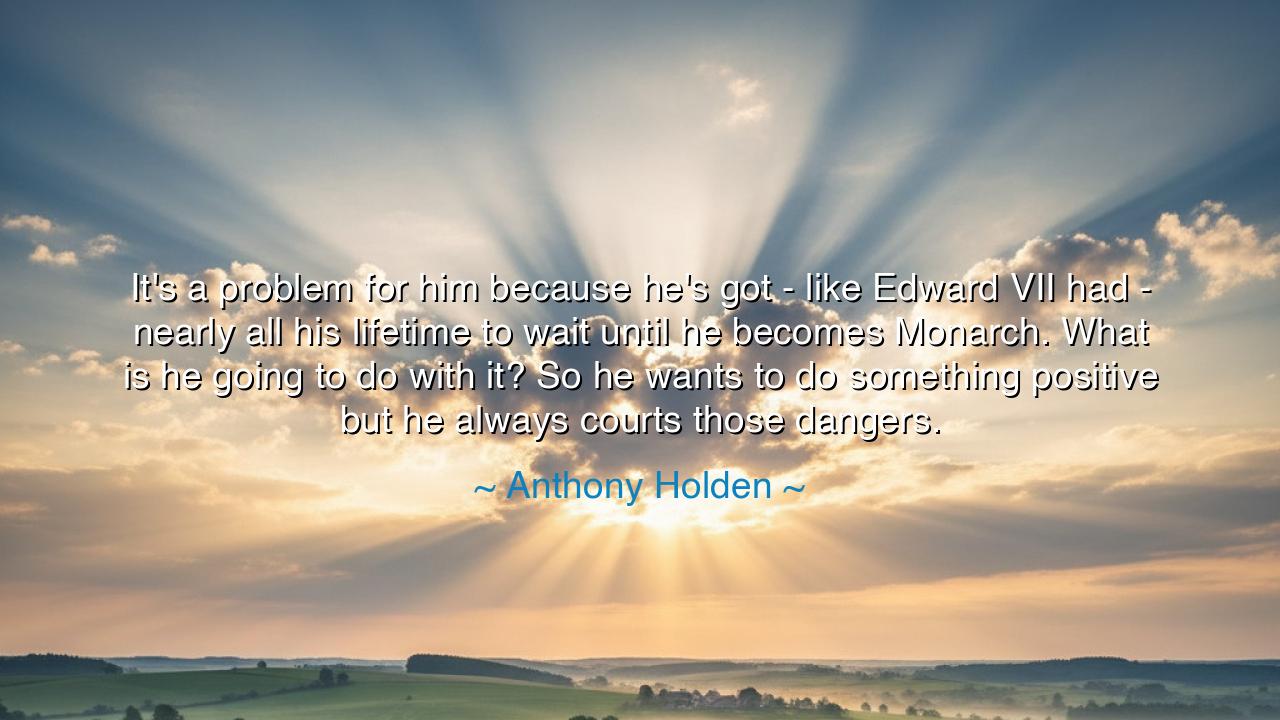
It's a problem for him because he's got - like Edward VII had -
It's a problem for him because he's got - like Edward VII had - nearly all his lifetime to wait until he becomes Monarch. What is he going to do with it? So he wants to do something positive but he always courts those dangers.






Hear the words of Anthony Holden: “It’s a problem for him because he’s got—like Edward VII had—nearly all his lifetime to wait until he becomes Monarch. What is he going to do with it? So he wants to do something positive but he always courts those dangers.” In this saying lies the burden of destiny delayed. For what trial is greater than to be bound to a throne not yet one’s own, to bear the weight of a crown unseen but ever pressing? Such a life is neither wholly free nor wholly sovereign, and thus every act carries peril.
The ancients knew this plight well. Think of Telemachus, son of Odysseus, prince but not king, awaiting the return of his father. His youth was consumed not by ruling, but by waiting, by proving himself in small deeds while the true crown lay beyond reach. So too, Holden compares the waiting prince to Edward VII, who lived decades in shadow before he could rule. In the long twilight of anticipation, the question burns: How shall one spend the years?
Edward VII, son of Queen Victoria, waited nearly sixty years before ascending the throne. Denied the fullness of power, he turned to society, diplomacy, and pleasure. Though derided at first as frivolous, he later proved himself a capable ruler when his time finally came. Yet in those years of waiting, he courted both admiration and scandal, for the idle prince is ever tempted by the snares of indulgence and misstep. This is the warning Holden draws forth: that the desire to do something positive may be entangled with the lure of danger.
To be heir is to live between two worlds—constrained by duty, yet restless with freedom. One may long to serve, to shape, to guide, but each action risks overstepping the bounds of a role not yet conferred. Here lies the paradox: the very energy that seeks to prove worthiness may summon criticism and peril. It is the trial of patience, the refining fire of restraint.
So let the generations remember: the measure of a ruler is not only in the years upon the throne, but in the decades of waiting that shape the soul before power is given. To endure long preparation without falling wholly into idleness or folly is itself a form of kingship. And when the crown at last descends, it rests more firmly upon the brow of one who has learned not only ambition, but also the wisdom of waiting.






TMNguyen Truong Minh
Holden’s analysis of someone waiting to become monarch raises an important point about the tension between wanting to make a positive change and the potential risks involved. In Edward VII’s case, this was a problem he had to navigate, but it makes me wonder—how does a person develop the wisdom to handle such long periods of anticipation? What kind of support structures or guidance would help someone avoid courting dangerous risks while waiting to fulfill their role?
KNTuan Kiet Nguyen
This quote really gets me thinking about the idea of being in a position of power with so much time ahead, like waiting for the moment to finally become monarch. The pressure to make a positive impact is immense, but I can also see how someone might be tempted to take dangerous risks in order to make their mark. How do individuals in such roles find a balance between caution and action? Can they ever truly escape the shadow of danger when trying to do good?
LNLong Nguyen
Holden’s insight into the dilemma faced by someone who has a long wait before becoming Monarch is thought-provoking. It makes me wonder about the emotional and psychological toll this could take. If someone has years to anticipate such a role, how do they manage to stay focused and grounded? I can imagine that wanting to make a meaningful contribution could create a sense of urgency, but I also wonder about the risks involved in rushing into decisions.
PHnguyen thi phuong hoa
Anthony Holden’s quote reflects on the pressure and challenges of waiting for such a long period to take the throne, similar to Edward VII. It’s interesting that he points out how the waiting period could lead to a feeling of restlessness and a desire to make a positive impact. But I wonder, does the desire to 'do something positive' ever conflict with the need to avoid the political risks that come with making bold moves? How does one balance these two factors?